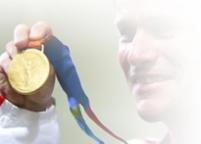|
Examination: facts and figures
|
2011 |
|
Questions |
34
multiple choice questions were proposed. After deliberation, the
jury decided that all 34 questions should be validated.
|
|
Pass / No-Pass
threshold |
To be declared
as having successfully passed the examination, the student must have
replied correctly to
50%
or more than 50%
of the
questions. |
|
Number of
correct answers for successful pass |
Any student having replied correctly to
17
or more than 17
questions has been declared as having successfully passed the
CSC examination |
|
Number of successful students |
55 students succeeded in the examination. |
|
Rewards |
-
CSC Diploma will be handed over to the students at the occasion of the closing
ceremony, Friday 26th of August.
-
The students with the
highest marks will be announced
at the closing session Friday 26th of August.
-
ECTS Certificates will be sent by post to the successful
students as soon as they have been printed by the University of
Copenhagen.
|
|
Marks |
Individual marks will be available on demand by email,
after the closing
session only, from Ivica Puljak (Ivica
(dot) Puljak
AT cern (dot) ch).
|
|
|
|
|
Examination: List of successful students
|
The CSC Jury is pleased to warmly congratulate the following
students who have successfully passed the 2011examination. |
|
The students
below have successfully passed the
examination.
We congratulate them!, François Fluckiger, CSC Director |
| Aguilar, Jonathan |
| Alonso Canella, Irene |
| Alvarez, Alejandro |
| Amoroso, Simone |
| Arsuaga-Rios, Maria |
| Au-Yeung, Fu Kit, Jay |
| Belhay, Mehdi |
| Berzano, Dario |
| Borer, Claudia |
| Bozyigit, Serkan |
| Butenas, Ignas |
| Cervigni, Francesco |
| Chatal, Francois |
| Ciubancan, Mihai |
| Delle Fratte, Cesare |
| Demicoli, Darren |
| Drasal, Zbynek |
| Dudziak, Agnieszka |
| Falabella, Antonio |
| Frank, Eike |
| Garcia-Martinez, Raul |
| Hajj, Raghida |
| Kepinski, Maciej Piotr |
| Kulakov, Igor |
| Leitgab, Martin |
| Lomidze, David |
| Luzzi, Cinzia |
| Magalhaes, Bruno |
| Magradze, Erekle |
| Malo de Molina Martinez, Manuel |
| Mancilla, Sebastian |
| Margiolas, Christos |
| Martin Clavo, David |
| Martin Marquez, Manuel |
| Martin Montull, Javier |
| Mascetti, Luca |
| Mattera, Andrea |
| Morawski, Piotr |
| Nikiel, Piotr |
| Nowotka, Michał |
| Pera Mira, Pablo |
| Perez Perez, Antonio |
| Praczyk, Piotr |
| Remenska, Daniela |
| Rodrigues Fernandes Rabacal, Bartolomeu
Andre |
| Rogers, Will |
| Sahin, Mehmet Ozgur |
| Saornil Gamarra, Sandra |
| Sindrilaru, Elvin |
| Subbiah, Vijay Kartik |
| Svirin, Pavlo |
| Tarocco, Nicola |
| Ubeda Garcia, Mario |
| Ustyushkin, Dmitry |
| Zyzak, Maksym |
55 students have successfully passed
the examination
2011 Podium: Pictures and Bio
1st Mark
2011 |
|
Alejandro ALVAREZ AYLLON |
CERN, Geneva - Switzerland |
|
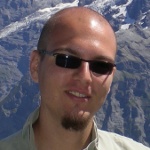
|
The first time I arrived to CERN was as an
Openlab Summer Student, in 2008. The next year I came back as a Technical
Student, working for the former Grid Deployment group. I started doing
testing of work elements at first, and storage later. After some time, I
developed a framework to enable nightly builds and tests through ETICS,
framework that is still at use and was presented at the 1st EMI
Technical Conference in Vilnius.
Finally, in November of 2010 I got the fellow position in the same group
(now named Grid Technology), and started moving from testing to more
development duties, although I am still maintaining the testing framework.
|
|
2nd Mark
2011 |
|
Simone AMOROSO |
Physikalisches Institut, Universität Freiburg -
Germany |
|

|
After working in the CDF experiment during my
master thesis I have started this year a PhD in Freiburg, working in the
ATLAS SUSY group. I am currently involved in developing a general search
strategy for new physics, looking at deviations from SM predictions in all
possible event topologies, to minimize the chance of missing new phenomena.
I am also taking part in an upgrade of the muon DCS. My preferred OS is a
Debian Linux, but if obliged I not disdain working on Windows. I have
extensive experience with C/C++ and the ROOT framework, and some knowledge
of python, LabView and VHDL.
|
|
|
|
|
Darren DEMICOLI |
University of Malta, Msida - Malta |
|
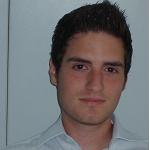
|
Last year I finished my BSc
in Computer Science and AI at the University of Malta. My main research area
was reliable programming of decentralized distributed systems. Currently I
work as a Linux/Unix system administrator and database administrator. My
main responsibilities include deployment, configuration and management of
servers (mainly RHEL4-6), as well as IBM Informix database administration
which includes performing schema changes, configuration tuning, database
backups/restores, replication and database storage maintenance. I also get a
reasonable firsthand experience with server virtualization and various
storage technologies including storage libraries and SAN’s. My future plans
include furthering my studies in computational science and performing
research in a scientific computing domain.
|
|
|
|
|
Andrea MATTERA |
Uppsala University - Sweden |
|
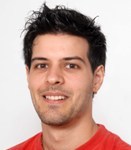
|
Last year (10/2010) I took my MSc in Physics at
the University of Insubria (Italy), with a specialization in Medical Physics
and a thesis dealing with Boron Neutron Capture Therapy applications.
I am now pursuing a PhD in Applied Nuclear Physics at Uppsala
University (Sweden). I will work in the measurement of neutron-induced
fission yields of several actinides and at different neutron energies, to
provide information to be used in future Gen-IV power plants or for the
handling of Spent Nuclear Fuel. I am
currently developing an analysis tool to perform the analysis of the data
that will soon be collected at the IGISOL-JYFLTRAP facility in Jyväskylä
(Finland).
|
|
|
|
|
Pablo PERA MIRA |
CERN, Geneva - Switzerland |
|
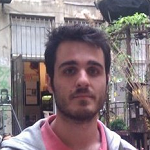
|
I am a software engineer working for the controls
group at CERN. We develop the software that the operators in the Control
Center use to operate the accelerator complex. Before coming to CERN, I
spent some time doing research multi-espectral image analysis in the
Technical University of Valencia, Spain, and also worked for Google, in
Zurich, in the Google Base team. I happened to be there when they launched
Android, and I've been developing (and launching) Android applications since
then. I had already explored a bit the mobile development world via Java ME
on MIDP while I was studying in the KTH, Stockholm, where I stayed for a
year. I am originally from Spain, and looking forward to make the best out
of CSC.
|
|
3rd Mark
2011 |
|
David MARTIN CLAVO |
CERN, Geneva - Switzerland |
|
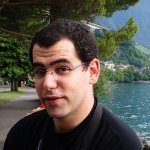
|
I am a software / web
engineer currently working in the CERN Service Management Team as a Fellow
in GS-SMS. My work consists mostly in technical aspects related to the
Service-Now system at CERN. I am the main developer of the CERN Service
Portal (
http://cern.ch/service-portal ). I am also involved in the Drupal
"movement" at CERN (ENTICE), having developed
http://services.web.cern.ch .
Previously, I worked two years in the Indico team, where I integrated Indico
with several collaboration tools (EVO, Vidyo...).
Before that, I worked one year in NTT Data (Japan), contributing to
the ActiveMQ Apache project. Given
all of the above, my technical knowledge covers: HTML/CSS/Javascript,
Python, Java, PHP, relational and object databases. My current interests are
website design / usability, search engines, application performance, and
security. I hope to learn more about some of these topics in the CSC.
|
|
|
|
|
Will ROGERS |
STFC, Rutherford Appleton Laboratory, Didcot – United Kingdom |
|
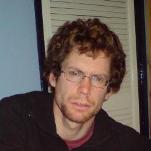
|
I did an MSci in physics at Cambridge before taking a year to travel. I
then started work at STFC near Oxford in the e-Science department. I am
currently working on two projects. One is APEL, the grid accounting system
used by EGEE and EGI. I am working on developing a new version of the system
in Python. The second involves collecting data from scientific experiments
including ISIS, a particle accelerator. My project is to collect data from
different sources including Microsoft Sharepoint and Oracle databases, and
prepare the storage database for the experimental data. I have got two
years' experience programming in Java and Python on Linux and I am currently
gaining experience programming C# in a Windows environment. I also like
playing many different sports and doing puzzles.
|
|
|
|
